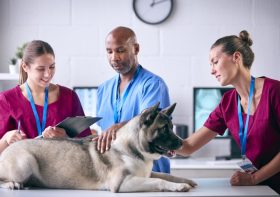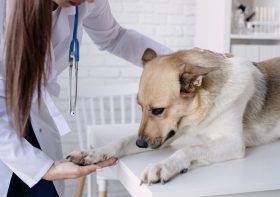What Are the Signs My Pet Needs to See a Vet Immediately?

As pet owners, we know the health and well-being of our furry friends are our top priority. However, it’s sometimes tricky to know when a situation is serious enough to warrant a trip to the vet. In this article, we’ll go over the critical signs that indicate your pet needs immediate veterinary attention. These insights will help you make informed decisions during stressful times.
Critical Signs Your Pet Needs Immediate Veterinary Attention
Difficulty Breathing
If your pet is having trouble breathing, it’s crucial to get them to a vet right away. Symptoms include wheezing, excessive panting, and struggling to catch their breath. Pets rely on smooth, unlabored breathing to maintain oxygen levels, so this is a clear emergency.
Severe Bleeding
Severe bleeding can quickly turn into a life-threatening situation. If the bleeding doesn’t stop within a few minutes or if it’s coming from a major artery, contact your vet immediately. Quick action can prevent blood loss and shock.
-
Continuous bleeding from a wound
-
Blood in urine or stool
-
Nosebleeds that won’t stop
Collapse or Seizures
If your pet collapses or has a seizure, you need to act fast. These signs can indicate severe underlying conditions or acute illnesses such as poisoning, epilepsy, or heart problems.
-
Unconsciousness
-
Episodes of shaking or convulsing
-
Sudden, unexplained weakness
Persistent Vomiting or Diarrhea
While occasional vomiting or diarrhea isn’t uncommon, persistent episodes can be more serious. It may lead to dehydration or signal another underlying issue. Remember, young pets are especially prone to rapid dehydration.
Refusal to Eat or Drink
While a missed meal here and there might not be alarming, refusing to eat or drink for more than 24 hours is a red flag. This behavior can indicate serious conditions like gastrointestinal problems, infections, or systemic illnesses.
Trauma or Injuries
Pets can get into all sorts of scrapes. Whether it’s a car accident or a high fall, any trauma requires immediate attention. Even if they seem fine, internal injuries might not be visible right away. Staying up-to-date on your pet’s vaccinations and preventive care is the first step toward a healthy life.
You can view this page for information on pet vaccinations and parasite prevention. These steps protect your pet from various diseases and conditions, reducing the risk of needing emergency care. Preventative measures are easier and often less stressful for both you and your pet.
Signs of Pain or Distress
Pets show pain in different ways. Signs include whimpering, unusual aggression, hiding, or avoiding being touched. If you notice any of these behaviors, it’s vital to consult your vet.
Swelling or Lumps
Unexplained swelling or lumps should be checked out, especially if they appear suddenly or grow rapidly. They could signify infections, abscesses, or even tumors.
Difficulty Urinating or Defecating
Struggles with urinating or defecating can signal severe issues like blockages. Especially in male cats, urinary blockages are life-threatening and need immediate attention. If your pet experiences chronic pain or inflammation, options like veterinary cold laser therapy can be beneficial. This non-invasive treatment helps reduce pain and improve mobility.
It’s frequently used to treat arthritis, joint pain, and other chronic conditions. When combined with a balanced diet and regular exercise, treatments like this can significantly improve your pet’s quality of life. Always consult your vet to see if this therapy is suitable for your pet’s needs.
Pale Gums or Tongue
Pale gums or tongues can be a sign of anemia, blood loss, or shock. Healthy pets usually have pink gums, so any deviation should be investigated without delay.
-
Pale or white gums
-
Slow capillary refill time
-
Unusual gum texture
Having a reliable vet is crucial. A professional vet in Fort Myers, FL can provide the necessary care during emergencies. Regular check-ups can also catch potential issues before they become serious.
Clinics in the area offer comprehensive services, including diagnostics, emergency care, and specialized treatments. Establishing a relationship with a vet you trust for routine visits and emergencies is wise.
Abnormal Behavior
Changes in behavior can be a tell-tale sign something is wrong. This includes excessive sleeping, changes in appetite, or sudden aggression. These signs are easy to overlook but can indicate underlying health issues.
Dilated Pupils
Dilated pupils can indicate various severe health issues, including poisoning, trauma, or neurological problems. Always take this symptom seriously and seek veterinary care promptly.
Trouble Walking or Lameness
Difficulty walking or sudden lameness can indicate fractures, sprains, or more severe neurological problems. These symptoms usually require immediate attention to prevent further damage.
By keeping these signs in mind, you’ll be better equipped to know when your pet needs urgent care. Your awareness can save precious time during an emergency.
Closing Remarks
Your pet relies on you to look out for their well-being. By recognizing these warning signs, you can act quickly to get them the care they need. Regular veterinary check-ups and being observant will ensure that your furry friend stays happy and healthy. Always trust your instincts and consult your vet if something seems off. Your pet’s health and happiness are worth it.


